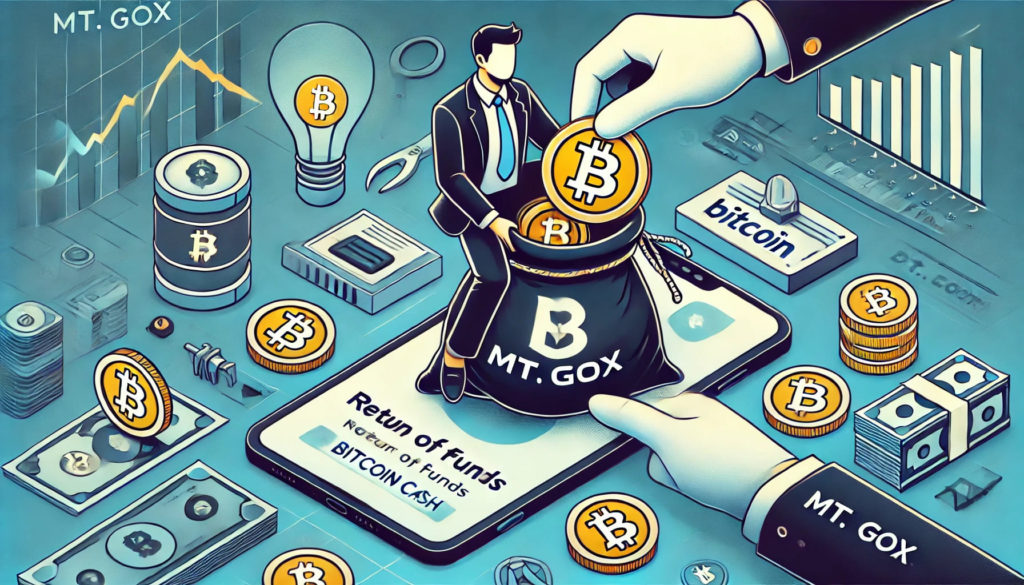
Mt. Gox Funds: Long-Awaited Returns Begin for Creditors
- June 29, 2024
- 7:45 pm
Tokyo, Japan – After nearly a decade of legal battles and financial uncertainty, creditors of the infamous Mt. Gox cryptocurrency exchange are finally seeing light at the end of the tunnel. The process of returning funds to those affected by the 2014 collapse has officially begun, marking a significant milestone in one of the most high-profile cryptocurrency cases to date.
The Mt. Gox Saga
Mt. Gox, once the largest Bitcoin exchange in the world, filed for bankruptcy in 2014 after losing 850,000 Bitcoins, worth around $450 million at the time, to hacking and mismanagement. The event sent shockwaves through the cryptocurrency community, highlighting the nascent industry’s vulnerabilities and the need for better security practices.
In the aftermath, approximately 200,000 Bitcoins (of which 160.000 will reportedly be returned) were recovered, and a lengthy rehabilitation process ensued. Creditors have been eagerly awaiting reimbursement, a process complicated by legal hurdles and the volatile nature of cryptocurrency prices.

Reimbursement Process Begins
Nobuaki Kobayashi, the appointed trustee for the Mt. Gox bankruptcy case, announced that the distribution of funds to creditors has commenced. The reimbursement will include both Bitcoin and Bitcoin Cash, along with fiat currency for some claimants. Kobayashi emphasized that the process would be meticulous to ensure fair distribution and compliance with legal standards.
“We understand the prolonged frustration and the financial impact this has had on the creditors,” said Kobayashi. “Our goal is to complete the reimbursement process as efficiently and transparently as possible.”
Impact on the Cryptocurrency Market
The release of a significant amount of Bitcoin and Bitcoin Cash into the market has raised concerns about potential volatility. Analysts predict that while there might be short-term fluctuations, the overall impact will be manageable given the current market depth and trading volumes.
“While the return of these funds is a pivotal moment for those affected, it’s also a critical test for the cryptocurrency market’s maturity,” noted Jane Smith, a financial analyst specializing in digital assets. “The market’s reaction will provide insights into its resilience and stability.”
A Step Towards Closure
For many creditors, the return of their funds signifies a long-awaited closure to a tumultuous chapter. However, it also serves as a stark reminder of the importance of robust security measures and regulatory oversight in the cryptocurrency space.
The Mt. Gox incident remains a pivotal lesson in the history of digital assets, underlining the need for vigilance and the ongoing evolution of the industry.
As the reimbursement process unfolds, stakeholders across the cryptocurrency landscape will be watching closely, hopeful that the lessons learned from Mt. Gox will pave the way for a more secure and resilient future.
Share Article
Recommended


Trump’s World Liberty Financial: A Bold Move into DeFi

Trump’s Memecoin Shakes Up the Market: The Rise of $TRUMP

MiCA Regulations Reshape the Crypto Landscape: What You Need to Know

Prevent most common crypto mistakes | How to DYOR

Best free crypto Sign-up bonus (2021)

Fundamental analysis explained

Non-Fungible Tokens (NFTs)

Russia’s New Crypto Mining Laws: A Game Changer for the Industry
Russia has officially implemented new cryptocurrency mining regulations, marking a significant shift in how digital asset operations are managed within the country. Effective November 1, 2024,

Caroline Ellison Sentenced to Two Years in Prison: The FTX Scandal Continues
Caroline Ellison, the former CEO of Alameda Research and a central figure in the FTX cryptocurrency collapse, has been sentenced to two years in prison for

Telegram CEO Pavel Durov Arrested in France: A Historic Legal Battle Begins
In a shocking and unprecedented move, French authorities arrested Pavel Durov, the CEO and founder of Telegram, on August 24, 2024. Durov, a well-known figure in

MemeCoins on the Rise: Memecoin insights June 2024
After the Bitcoin market cap has breached 1 trillion dollars and it has convinced researchers at the Deutsche bank that the cryptocurrency is here to stay for a long time.

 Bitcoin
Bitcoin  Ethereum
Ethereum  Tether
Tether  XRP
XRP  USDC
USDC  Solana
Solana  TRON
TRON  Dogecoin
Dogecoin  Lido Staked Ether
Lido Staked Ether  Figure Heloc
Figure Heloc  Bitcoin Cash
Bitcoin Cash  WhiteBIT Coin
WhiteBIT Coin  Cardano
Cardano  USDS
USDS  LEO Token
LEO Token  Wrapped stETH
Wrapped stETH  Hyperliquid
Hyperliquid  Chainlink
Chainlink  Wrapped Bitcoin
Wrapped Bitcoin  Ethena USDe
Ethena USDe  Binance Bridged USDT (BNB Smart Chain)
Binance Bridged USDT (BNB Smart Chain)  Canton
Canton  Monero
Monero  Stellar
Stellar  USD1
USD1  Wrapped eETH
Wrapped eETH  Rain
Rain  Hedera
Hedera  sUSDS
sUSDS  Dai
Dai  Zcash
Zcash  Litecoin
Litecoin  Coinbase Wrapped BTC
Coinbase Wrapped BTC  PayPal USD
PayPal USD  Avalanche
Avalanche  Shiba Inu
Shiba Inu  WETH
WETH  Sui
Sui  Toncoin
Toncoin  World Liberty Financial
World Liberty Financial  USDT0
USDT0  Cronos
Cronos  Tether Gold
Tether Gold  MemeCore
MemeCore  PAX Gold
PAX Gold  Uniswap
Uniswap  Polkadot
Polkadot  Mantle
Mantle